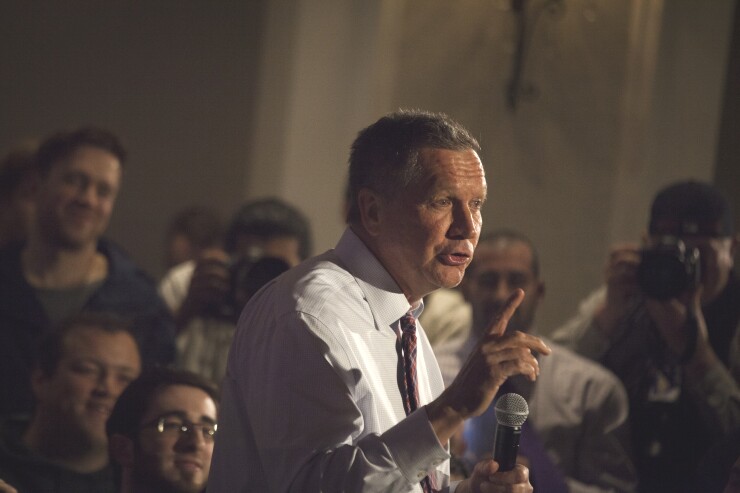WASHINGTON – The nation's governors and mayors, concerned over potential strains on their finances, are urging congressional Republicans to take a bipartisan approach on health care and tax reform.
A barrage of new public appeals came this week from governors and mayors worried about the Senate Republican plan to roll back federal support for an expansion of Medicaid as part of the repeal and replacement of the Affordable Care Act. Moody’s Investors Service has issued a negative credit profile for states because Senate bill places a bigger financial burden on states for Medicaid costs. Fitch Ratings issued a similar warning for public hospitals.
State and local officials expressed similar concerns about the national GOP’s closed-door effort to formulate a tax reform package.
Though the Municipal Bonds for America coalition has received assurances that the tax exemption for municipal bonds is not in jeopardy, lowering top tax rates may dilute the value of the muni exemption to investors. And the possible elimination of deductions for state and local income taxes have also raised concerns, especially in high tax states like New York, New Jersey and California.
Republican governors and mayors want their GOP counterparts to rethink their strategy.
“Healthcare is a nonpartisan and a local issue,’’ the Republican mayor of Mesa, Ariz., John Giles, told reporters in a conference call Wednesday. "And cities are a huge part of the healthcare delivery in our country."
Medicaid often pays for their treatment of people with mental health issues and substance addiction who are the subjects of many local police and ambulance calls.
“This is a daily and weekly tragedy that is occurring in the cities and towns of the United States,’’ Giles said.
Giles was the only Republican among several mayors on the media call, as his counterparts also stressed the importance of Medicaid in battling the opioid epidemic, paying for nursing home expenses and keeping low income residents out of hospital emergency rooms.
Among Republican governors, Ohio Gov. John Kasich is the most outspoken advocate for a new strategy. He’s made references to the 1997 deal he helped broker with President Clinton to balance the federal budget. At the time Kasich chaired the House Budget Committee.

“The big change I would like to see is to get some Democrats involved,’’ Kasich said on CNN Tuesday in a joint interview with the Democratic governor of Colorado, John Hickenlooper.
“I'd love to see the Democrats announce that they want to be constructive and together they can make this thing stable and they can make it something that can last, that can have resilience,’’ Kasich said. “Because if one party does it, we're going to be right back where we were when Obamacare went through on a partisan vote.’’
Some Republicans in the U.S. Senate are calling for bipartisan approach.
Sen. Shelly Moore Capito, R-W.Va., predicted if Senate Republicans fail to agree on revisions to their health plan by the end of this week “the floodgates would probably open to reach a bipartisan compromise.’’
Capito’s comment came during a Wednesday appearance on CNN.
The tax reform legislation is being negotiated by the senior officials in the Trump administration and top congressional Republicans.
But Sen. Orrin Hatch of Utah, the Republican chairman of the Senate Finance Committee which writes tax policy, said Tuesday that he wanted “to rebut the growing narrative in the media and elsewhere that tax reform is going to be a secretive exercise involving the input of only a few key players.’’
Hatch made the comment in a speech on the Senate floor, in which he equivocated by noting he was only speaking for the Senate.
“I don’t think this process should be limited to Republican input,’’ Hatch said. “I want to see Democrats at the table. I want a bipartisan process that renders a bipartisan result.’’





